Product Update - November 2019
IMIconnect v5.3.1 release brings a new and powerful feature, Flow Analytics (currently in Beta), that
enables you to view and analyze the execution stats of your live flows and gain valuable insights to
make contextual enhancements and improve customer experience. These apart, we’ve made several
upgrades and enhancements in iOS and Android SDKs including support for multiple user profiles on
a single device, support for iOS 13 and Android 10, migration to AndroidX, and notable changes in-app profile and device monitoring attributes.
Read the SDK enhancements section for full details of the changes and how it may require some changes to be made at your end.
Here’s a summary of all key updates:
- Flow Analytics to analyze the performance of live flows
- Support for click notifications for an email in Messaging API v2
- Addition of IMIcampaign Profile Node
- Ability to track SMPP message status
- Push and In-App Messaging
- SDK enhancements
- APNS Push Token Support
- Enhancements in debugging console for Query by Destination ID.
See below for full details.
New Features
Flow Analytics (Beta Launch)
We’re introducing a new ‘Analyse’ mode (currently in Beta) within the flow builder to help you
analyze the performance of live flows. It helps you to view the execution stats/patterns for published
flows and draw contextual insights to make relevant changes and/or potential enhancements to
your IMIconnect flows.
Flow Analytics is available as an optional paid add-on for clients and needs to be activated before
you can start using it. Get in touch with your account manager if you would like to use this
feature.
It is available starting IMIconnect v5.3.1 onwards and would require you to transition to the latest version of IMIconnect before you can start using this feature.
Here’s a brief overview of the flow analytics feature:
- Once you’ve published a flow and it’s been in execution for some time, you can see the
execution stats (at the node level as well as at the connector level) by selecting the Analyse mode by clicking the toggle button at the top of the flow builder screen (see Figure 1). - Flow analytics is specific to each version of the published flow. You can select the desired version from the version dropdown at the top left section
- You can configure the duration for which you would like to analyze the performance of a
published flow subject to the time period for which a particular flow version was live - Flow sharing option (that allows you to share the published flows in view-only mode with
your colleagues) now supports the sharing of flows in analyze mode as an option. This helps in
sharing flow performance details with other stakeholders in a visual format.
Execution Statistics
The execution stats are captured from the date the flow analytics feature is enabled
for your tenant.
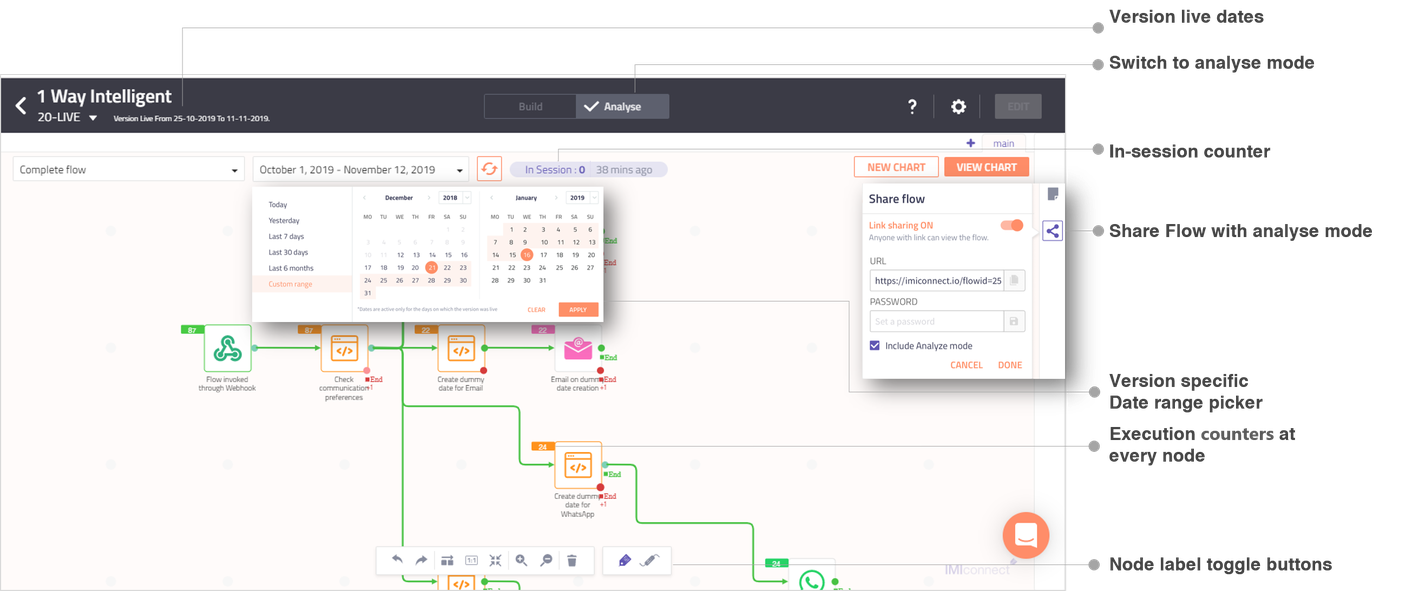
Figure 1: Analyse Mode
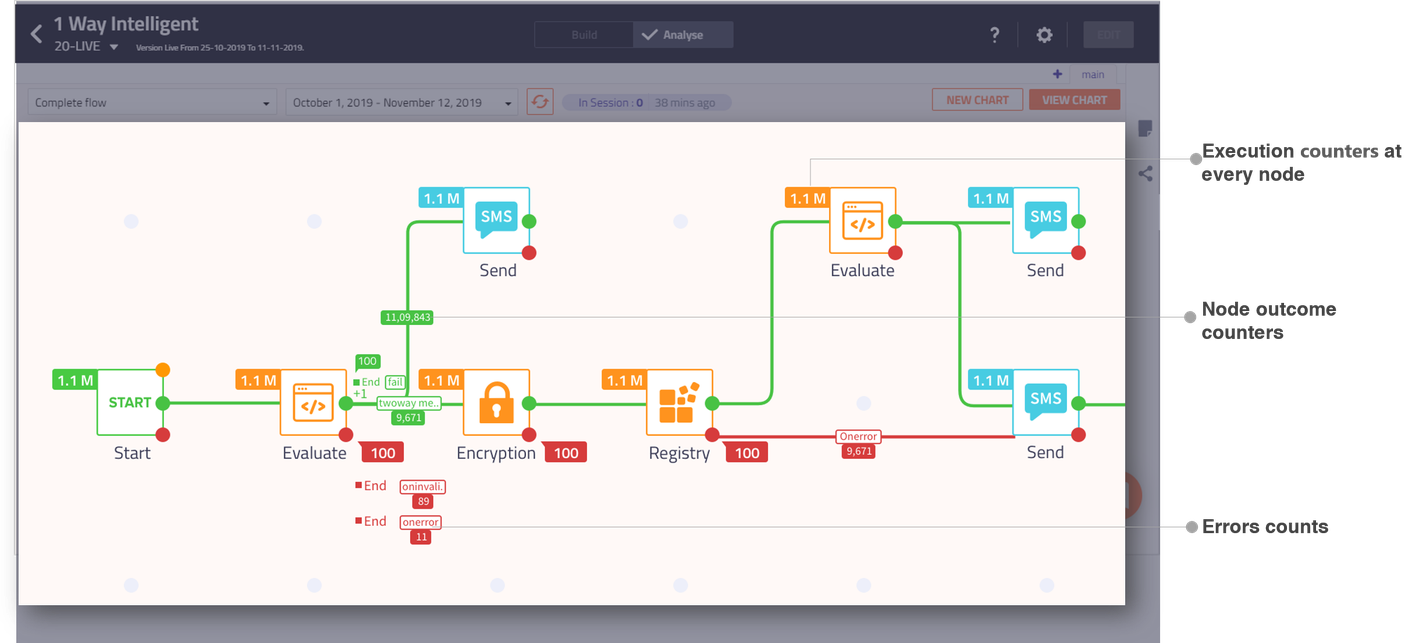
Figure 2: Node Execution Counters
Sankey Charts
- Along with node-level execution counters, we provide you the ability to view the flow performance in Sankey chart (ref: Figure 3)
- Sankey charts are also specific to the flow versions and are available for all the pages of the flow version
- Sankey charts can be exported in 3 different formats. (SVG, PNG, and CSV).
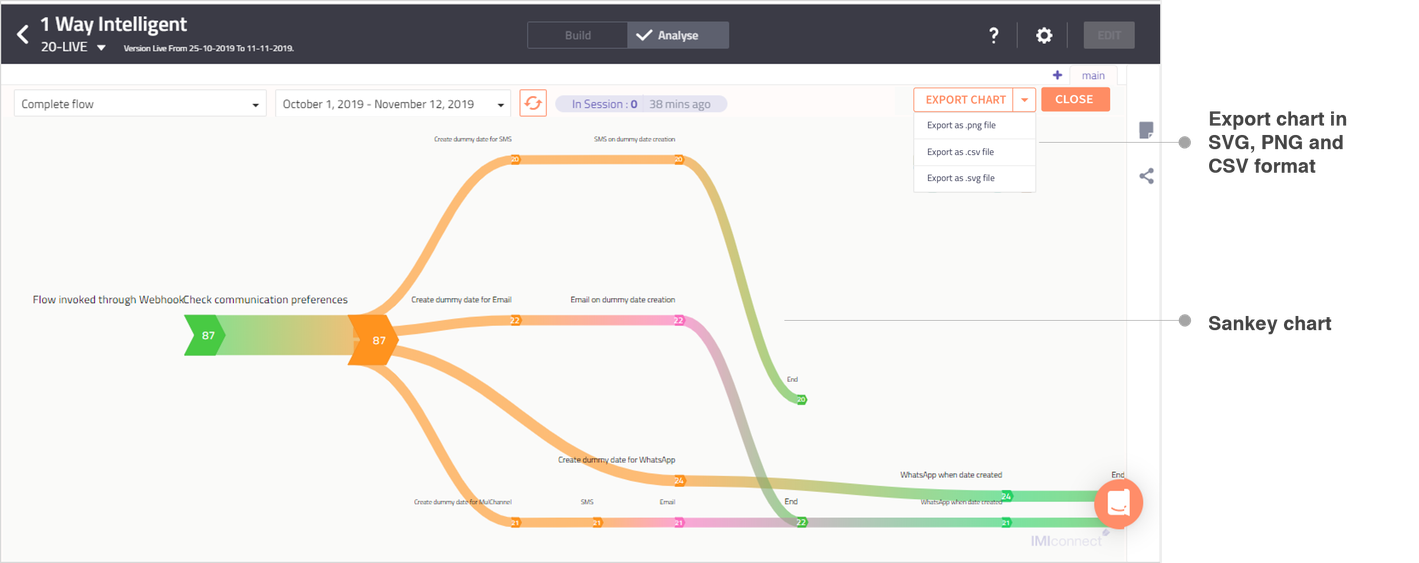
Figure 3; Sankey Chart
View Sankey charts from UI reports section
- Sankey charts are accessible from the reporting section as well
- This provides the ability to analyze the flow performance without the need to navigate to the concerned service and flow explicitly.
Analyzing the performance of segments of a flow
- You can use ‘NEW CHART’ option to select nodes and define flow-segments to analyze their performance
- This also is specific to flow versions and you need to create charts separately for each flow version.
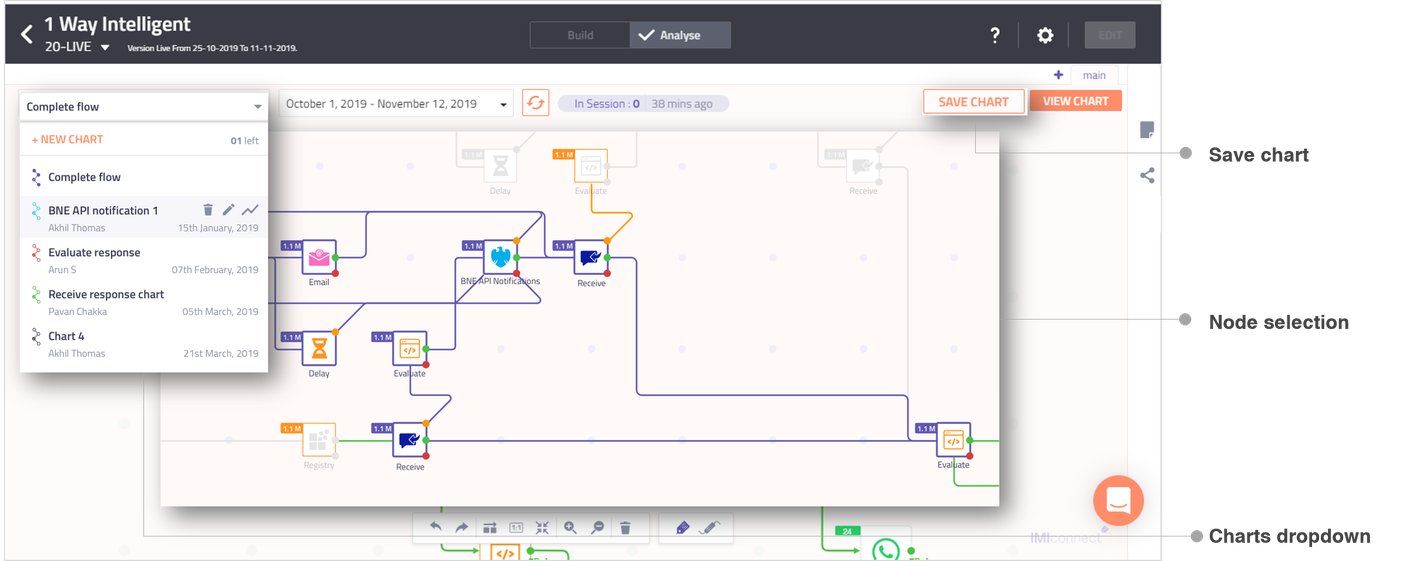
Figure 4: Node selection to analyse the performance of flow sub-segments
Click Notifications for Emails in Messaging API v2
With the last release of IMIconnect, we introduced Email API as a part of our messaging API v2. Now
we are adding click tracking capabilities to the API.
Once enabled all links in the email will be auto-tracked and if you wish to not track any link, you will
need to tag the link anchors with no-track-connect option as mentioned in the API documentation.
Once a customer clicks the tracked link, you will start receiving real-time click notifications.
For more information, refer to Messaging API v2 documentation.
IMIcampaign Profile Node
IMIcampaign is a cross-channel campaign management software from IMImobile. It enables
enterprises to send personalized and targeted offers to their customers and prospects over email,
SMS, MMS, voice, and other channels. IMIcampaign can be used in combination with IMIconnect to
enable automated offer provisioning and improve customer experience.
One of the key capabilities offered by IMIcampaign is a centralized customer profile that offers the
ability to capture, store and manage huge volumes of relevant customer data.
In this release, we have added an IMIcampaign profile node. This enables IMIconnect users to make
CRUD operations over profiles in their IMIcampaign tenant (if they are IMIcampaign users as well).
This node needs to be provisioned on request for users with access to both IMIcampaign and
IMIconnect products, and will not be available by default.
Here is a quick summary:
- CREATE - To add an entry to the profile by specifying the unique primary key
- FETCH - Allows you to fetch profile details of the selected profile with the specified primary
key. All the attributes of the selected profile will be available as output variables of the node - UPDATE - Allows you to update all/particular attribute of the selected profile with specified
primary key - DELETE - To delete an entry to the profile by specifying the unique primary key.
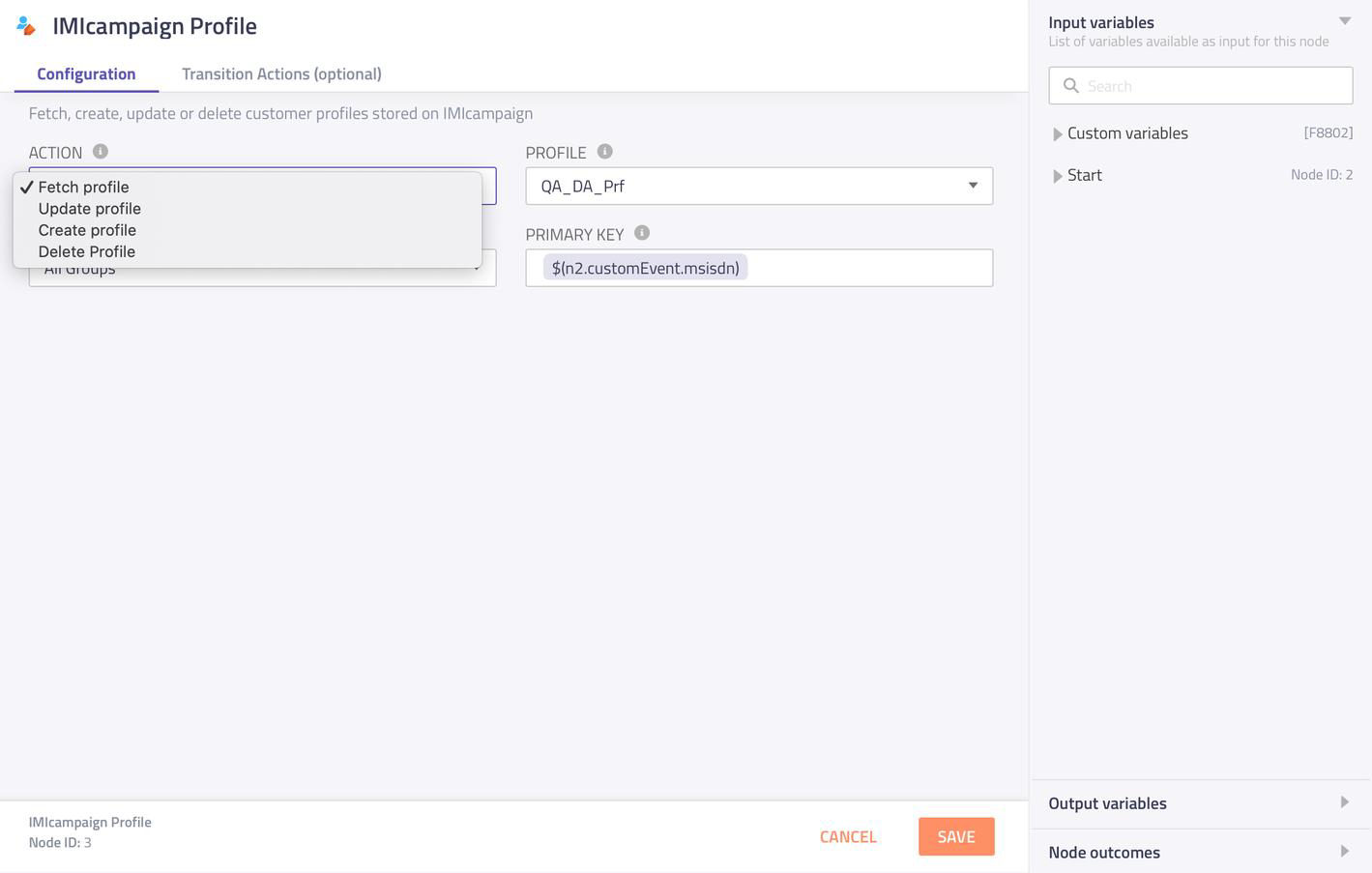
Figure 5: Configuration of IMIcampaign Profile Node
Ability to Delete Pre-built Integration Authorizations
We did not have support for deleting the authorized instances of pre-built integrations till now.
From IMIconnect release v5.3.1 onwards you will be able to delete authorizations of a pre-built
integration from Integrations section as well as from within the node UI of the concerned
integration.
If there are any live flows that are using the authorization that you are deleting, you will be alerted
about the flows which will get affected.
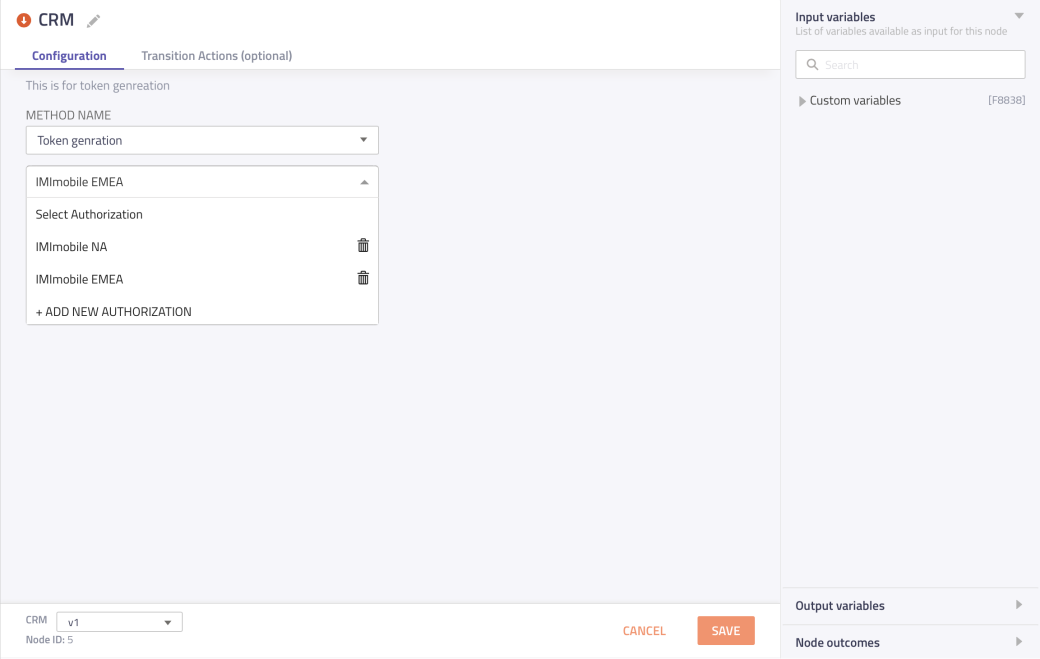
Figure 6: Ability to delete authorizations within the pre-built integration nodes
Improvements and Enahancements
Default State of Debug Logs to Inactive
Starting IMIconnect v5.3.1, we are changing the default state of ‘debug logging’ to inactive for existing
as well as new services. If you want to enable debug logs for any of your services, you can enable it
from ‘Flow settings > General tab’ in the new interface to capture detailed logs.
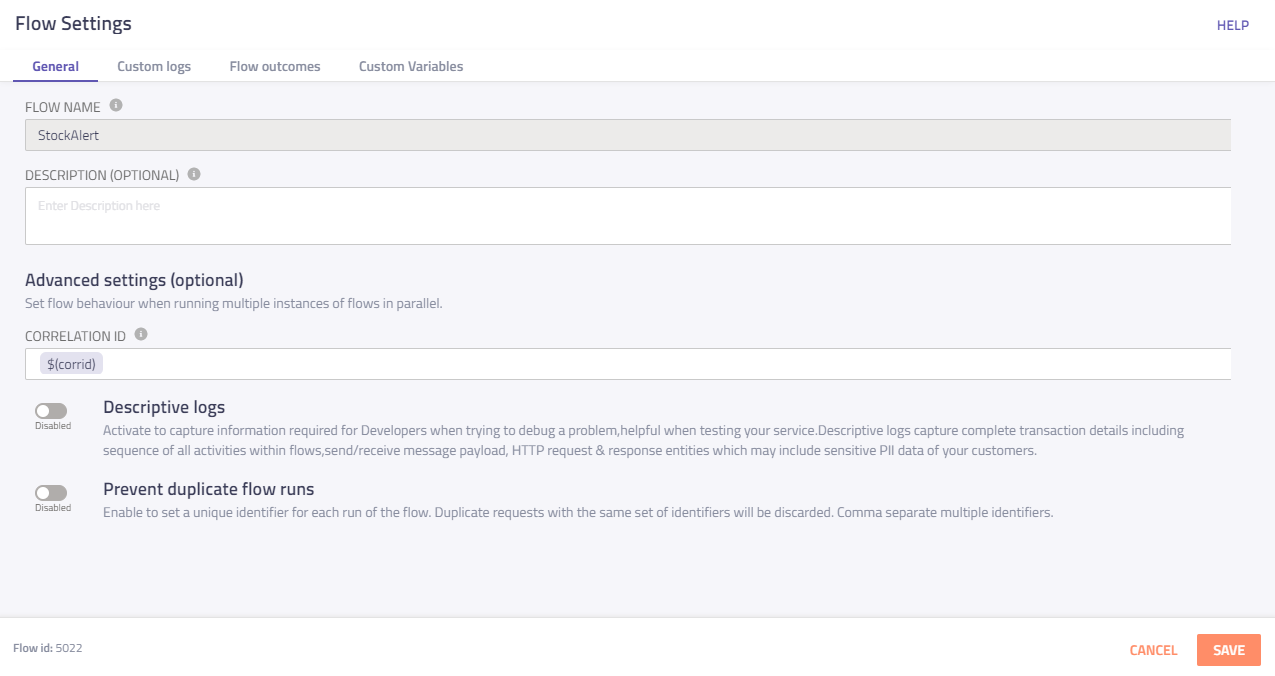
Figure 7: Descriptive Logs setting will be set to ‘Disabled’ by default starting v5.3.1 onwards
In case of old UI, you will need to enable the debug logging from ‘Service -> Settings’ section as
shown below.
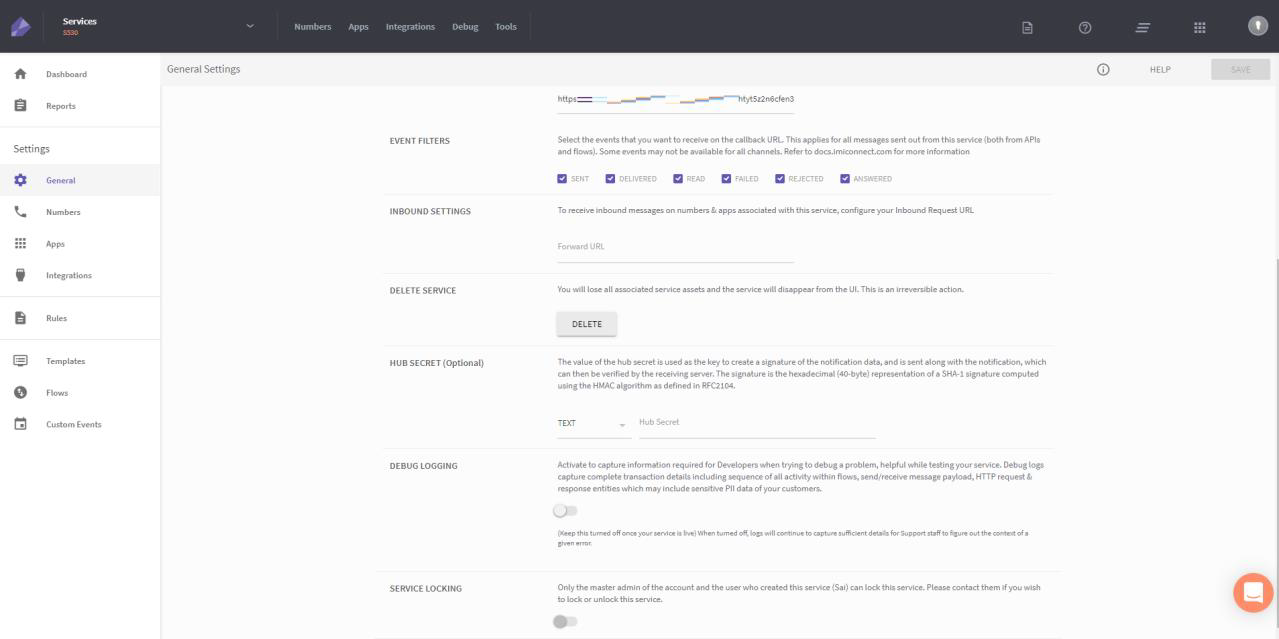
Figure 8: Debug Logging setting in IMIconnect old UI
Important!
We’re changing the standard behavior of debug logging for all versions of IMIconnect. The default setting for debug logs will be reset to ‘disabled’ for all the services and this applies to all versions of IMIconnect including tenants that have not been migrated to the new UI of IMIconnect.
As a policy, debug data (for services that have debug logs enabled) is captured only for the last 7 days because it is required for troubleshooting purposes. If you want this data to be captured for any of your existing or new services, you will need to explicitly activate it (including the services which had it activated until the v5.3.1 release) once the release has been done.
Ability to Turn on/off SMS Delivery Report Status when using SMPP
You can configure an outbound webhook to receive notifications when an SMS is submitted, delivered, undelivered, failed or clicked for an SMPP enabled service. Endpoint and hub secret configurations are not required because in the case of SMPP the notifications are sent back to the SMPP queue where the endpoint is already configured.

Figure 9: Webhook configuration for tracking SMPP message status
This will not have an impact on the existing services on both old UI and new UI.
SMPP SMS option is not enabled by default. Get in touch with your account manager if you
want to avail this feature.
Push and In-App Messaging
SDK enhancements
Here’s a summary of key changes and enhancements included in recent SDK releases. Additionally refer the SDK release notes for Android SDK and iOS SDK for complete details.
Multi Profile Support
With this release, IMIconnect iOS SDK v2.12.0 and Android SDK v2.12.0 can be used to send push
messages to all the users who use the same app on the same mobile device (i.e. multiple user ids
within a single user app profile). However, in-app messages can be sent only to the user for which the
imiconnect.register method was invoked most recently (i.e., the active mobile app user).
App Profile Changes
We’re making a change in the App Profile reducing the number of attributes that are
captured/maintained through our iOS and Android SDKs. The change has been introduced keeping
in view the app verification processes of various app stores and to make it easier for clients to get
their apps listed.
Following this change, the latest version of SDKs (i.e. iOS v2.12.0 and Android v2.12.0 onwards) will
capture/monitor only the following 15 attributes as part of the App Profile.
- rtmId
- verified
- userId
- deviceId
- customerId
- Os
- pushId
- last_opened
- ios_fcmpushid
- language
- Timezone
- foreground [*applicable only for Android]
- guest
- status
- createdOn.
The full list of variables that were supported before this change is accessible in the Device Attributes section.
See below table to understand the behavior of the various SDK and app asset combinations:
SDK (Down)/ App Asset (Right) | App Assets configured before v5.3.1 | App Assets configured v5.3.1 onwards |
|---|---|---|
iOS/Android SDK |
|
|
iOS/Android SDK |
|
|
Attributes for App Profile
IMIconnect profile APIs will support only the above mentioned 15 attributes in the App profile for
the app assets configured v5.3.1 onwards. However, app assets configured before IMIconnect v5.3.1 will continue to support all 52 attributes.
Support for iOS 13
We’ve updated our iOS SDK to ensure compatibility with the new push id / token format introduced
in iOS 13. Please upgrade to the latest version of our iOS SDK to send push notifications to new
users (i.e. first-time app installation) on iOS 13.
Without upgrading to iOS SDK v2.11.2 and onwards, push notifications cannot be sent to first
time users/app-installs on iOS 13.
Support for Android 10
We’ve updated our Android SDK to support compatibility with Android 10. You will need to use
IMIconnect Android SDK v2.11.2 onwards to leverage Android 10 features.
AndroidX Migration
Following the latest best practice guidelines published by Google, Android SDK has undergone
AndroidX migration. To be able to use the latest Android SDK (SDK 2.11.2 onwards) apps must be
migrated to AndroidX. For more information on this, refer to Android docs on AndroidX
migration here.
Other Changes
Refer the SDK release notes for Android SDK and iOS SDK for complete information on SDK
changes and enhancements.
NGMP Reports on 5.x UI
We have added NGMP reports in the new UI. You can view reports by selecting the NGMP enabled service and the desired date range from Reports.
APNS Authentication Token Support
We provide you with an option to use either of FCM or APNS as a gateway for sending push
notifications to iOS devices. To configure an app while using the APNS gateway option, we were
supporting only Certificate-based authentication until now.
IMIconnect release v5.3.1 onwards we are adding token-based authentication as well. The advantage
of using this method is that it is a one-time setup and does not require any periodic maintenance.
In case you want to use FCM gateway for sending push notifications on iOS devices, you need to
configure the APNS token on Firebase console. Refer to the following FCM docs for more
information on it.
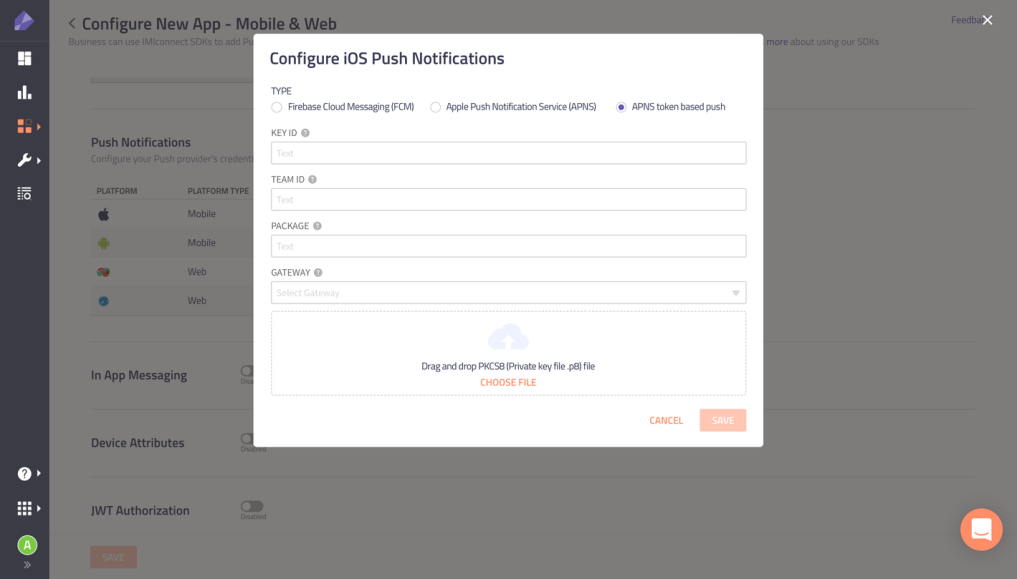
Figure 10: Token based authentication for APNS
Query by Destination ID
We’ve made some enhancements in debug console to further enrich the functionality to query by
destination id feature. You can now filter the queried transactions by service, source, status and time
period.
In addition, inbound and outbound messages are grouped by source transaction enabling you to
debug transactions much faster.
The status of the source transaction is also displayed. For example, flow transaction statuscompleted/
pending.
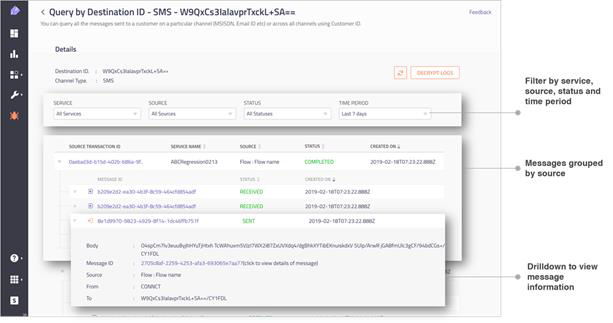
Figure 11: Destination ID is shown in encrypted format
Additional Notes
We mentioned in IMIconnect release v5.3.0 that we have updated the configuration settings for
Messaging Tags on Messenger node, Messaging API, and Rule Actions based on recent messaging
policy changes introduced by Facebook.
Facebook has updated its messaging policy, now restricting businesses to reply outside the 24-hour standard messaging window without an appropriate message tag. Refer to the official
messenger documentation for details on the new message tags and the corresponding messaging use-cases.
This requires a change to be made in your existing message tags before January 15, 2020.
Changelog
Added
- Flow Analytics (Beta Launch)
- Click notifications for Email in Messaging API v2
- IMIcampaign Profile Node
- Ability to delete pre-built integration authorizations.
Improved
- The default state of debug logs changed to inactive
- Ability to turn on/off SMS delivery report status when using SMPP
- Push and In-app Messaging
- APNS Authentication Token Support
- NGMP Reports on 5.x UI
- Query by Destination ID.
IMIconnect release v5.3.1
